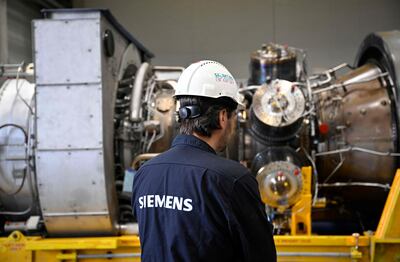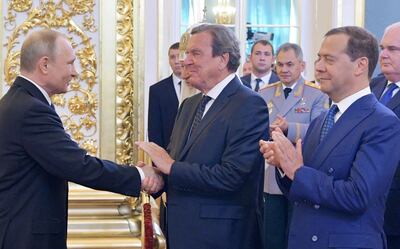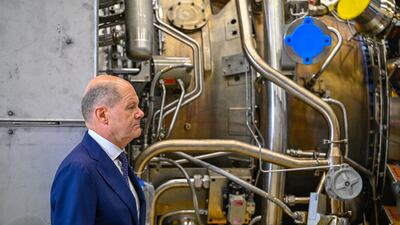German Chancellor Olaf Scholz said on Wednesday there was nothing stopping Russia from increasing its gas supplies to Europe, as he inspected a pipeline turbine at the heart of the East-West energy standoff.
Mr Scholz said the repaired turbine was ready to be shipped to Russia and go back into service on the trans-Baltic Nord Stream 1 pipeline, rejecting claims by Russian exporter Gazprom that the hold-up was due to technical problems.
State-owned Gazprom last week slashed exports via Nord Stream to 20 per cent of capacity, deepening fears of an energy shortage in Europe and renewing accusations that Russia is blackmailing countries opposed to its invasion of Ukraine.
Reinstalling the turbine would raise exports back to 40 per cent, but the pipeline part has become the object of a geopolitical tug-of-war as Europe races to fill up its gas tanks before winter.
Repaired in Montreal, it was shipped back to Europe after Canada agreed to waive sanctions, angering Ukraine, but its location was a secret until Mr Scholz announced a visit to the Siemens plant where it is stuck in transit. Germany accuses Russia of making spurious excuses to block its return.
Standing by the turbine at the plant in Muelheim, western Germany, Mr Scholz said all the required approvals were in place and that Gazprom just needed to arrange for the turbine’s collection.
“I saw it with my own eyes: the serviced turbine is there and ready for operation at any time,” Mr Scholz said. “It just has to be requested by Russia. There are no technical reasons for reducing gas supplies.”
A statement from Gazprom appeared to rule this out contending that Canadian, EU and UK sanctions make delivery of a Siemens turbine to the pipeline impossible.
"The sanctions regimes of Canada, the EU, the UK and a mismatch of the current situation with the existing contractual obligations by the Siemens side make delivery of the 073 engine to the Portovaya compressor station impossible," Gazprom said.
He said a Russian request was needed because Germany could hardly just “drive it to the harbour in St Petersburg, unload it on the quayside and say, there it is”, and it would prefer to have specific delivery instructions.
Christian Bruch, the chief executive of Siemens Energy, said his company had an ongoing dialogue with Gazprom but that they did not see eye to eye on the delivery of the turbine.
He said there was no obvious reason why three other turbines should also be out of action, preventing the 1,224-kilometre Nord Stream pipeline from operating at full pelt.
Mr Scholz said Germany had to be ready for more Russian excuses to emerge in the coming months as Europe gears up for a difficult winter because of the war in Ukraine.
Russia has wholly cut off supplies to some EU countries, including Latvia, Poland and Bulgaria, for failing to pay in roubles.

Kremlin spokesman Dmitry Peskov on Wednesday dangled the prospect of Europe receiving gas through the Nord Stream 2 pipeline, a Moscow-led project that was blocked by the West as Russia sent troops into Ukraine.
Facing lower supplies, Germany has brought in a number of energy-saving measures and is hurriedly building liquid gas terminals on its northern coast so that it can widen its range of gas suppliers by the New Year.
Modelling by Germany's power grid regulators suggests that even a hefty cut in consumption might not be enough to make the sums add up if the existing Nord Stream flows dry up completely.
Not for the first time, Mr Scholz had to field questions about Kremlin-friendly comments by former chancellor Gerhard Schroeder, his predecessor but one and a personal friend of Russian President Vladimir Putin.
Mr Schroeder, a former lobbyist for Gazprom, has been stripped of some of his retirement perks because of his links to the Kremlin but he refused to apologise for them in an interview with the magazine Stern.
He suggested Siemens was to blame for the latest hold-up and said the “easiest solution” to the gas crisis would be to switch on the parallel Nord Stream 2 pipeline, completed last year but suspended by Mr Scholz.
While describing the invasion of Ukraine as a mistake, he echoed Kremlin talking points by saying Russia had justified fears of being surrounded by hostile forces, and said he had spoken to Mr Putin during the war.
“Maybe I can still be useful,” said Mr Schroeder, who was chancellor from 1998 to 2005. “Why should I apologise?”



